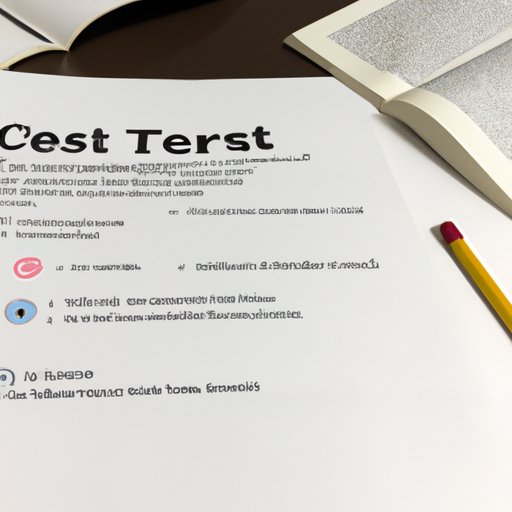Introduction
Test taking can be a daunting task for many students, regardless of age or academic level. Being a good test taker requires preparation, practice, and knowledge of the material being tested. It’s important to understand how to approach a test and what strategies can be used to ensure success.
This article will provide tips and strategies on how to become a better test taker. We’ll discuss the importance of reading and understanding the material before taking the test, making a study plan, analyzing the questions carefully, utilizing practice tests, taking breaks during the test, and using mnemonic devices to help remember information.

Read and Understand the Material Before Taking the Test
Before taking any test, it’s important to read and understand the material that will be covered. Researching the test content ahead of time can give you an idea of what to expect and help you prepare accordingly. Reviewing your study materials is also essential, as this will help refresh your memory on key concepts and terms.
Creating notes to help remember the material is also helpful. Writing down key points and ideas can be a great way to reinforce what you’ve learned and recall it more easily when you need it during the test. Taking the time to review and make notes can go a long way in helping you prepare for the test.
Make a Study Plan and Stick to It
Having a study plan is essential for any test taker. Setting goals for yourself and breaking down the material into manageable chunks can make studying easier and more effective. Scheduling time for breaks is also important, as this will allow you to take a break from studying and come back with a fresh perspective.
Sticking to your study plan is just as important as setting one up. Having a plan and not following through with it can lead to feeling overwhelmed and discouraged. Making a commitment to yourself and following through with it can help you stay focused and motivated.

Analyze the Test Questions Carefully
When taking the test, it’s important to read each question thoroughly and identify any keywords that may indicate what the question is asking. Understanding what is being asked and how it relates to the material can help you answer the question accurately and efficiently.
It’s also important to pay attention to any instructions given. Make sure you understand what is expected of you and follow the instructions closely. Doing so can help you avoid making any costly mistakes.

Utilize Practice Tests to Prepare
Taking sample tests can be a great way to prepare for the real thing. Not only will it give you a better sense of what to expect, but it can also help identify areas of weakness and make adjustments as needed. Utilizing practice tests can be a great way to familiarize yourself with the material and increase your confidence going into the actual test.
Take Breaks During the Test
Taking breaks during the test can be beneficial in a number of ways. Slowing down when working through questions can help you focus and avoid making careless mistakes. Taking short breaks between sections can also help keep your mind sharp and alert.
It’s important to avoid any distractions during breaks. This includes checking your phone, talking to other students, or browsing the internet. Taking a few moments to clear your head and refocus can be a great way to maximize your performance.
Use Mnemonic Devices to Help Remember Information
Mnemonic devices can be a great way to help remember information. Techniques such as acronyms, rhymes, and visualization can be a helpful way to recall facts, figures, and concepts.
Using mnemonic devices can also make learning and memorizing information more enjoyable. Creating a story or visual image can help make the material more engaging and memorable.
Conclusion
Test taking can be a challenging task for many students. Following the tips and strategies outlined in this article can help you become a better test taker. Reading and understanding the material before taking the test, making a study plan, analyzing the questions carefully, utilizing practice tests, taking breaks during the test, and using mnemonic devices to help remember information are all essential components of successful test taking.
By following these tips, you’ll be well on your way to becoming a better test taker and achieving success on the exams you take.
(Note: Is this article not meeting your expectations? Do you have knowledge or insights to share? Unlock new opportunities and expand your reach by joining our authors team. Click Registration to join us and share your expertise with our readers.)
